Legal Principles in Corporations Law Matters & Functions of Takeover Panel
VerifiedAdded on 2023/06/18
|8
|3107
|267
AI Summary
This article discusses legal principles in corporations law matters such as roles of bidders and targets, powers of administrator and receiver, and functions of takeover panel. It also covers the distinction between compulsory and voluntary winding up, and breach of director's duties.
Contribute Materials
Your contribution can guide someone’s learning journey. Share your
documents today.
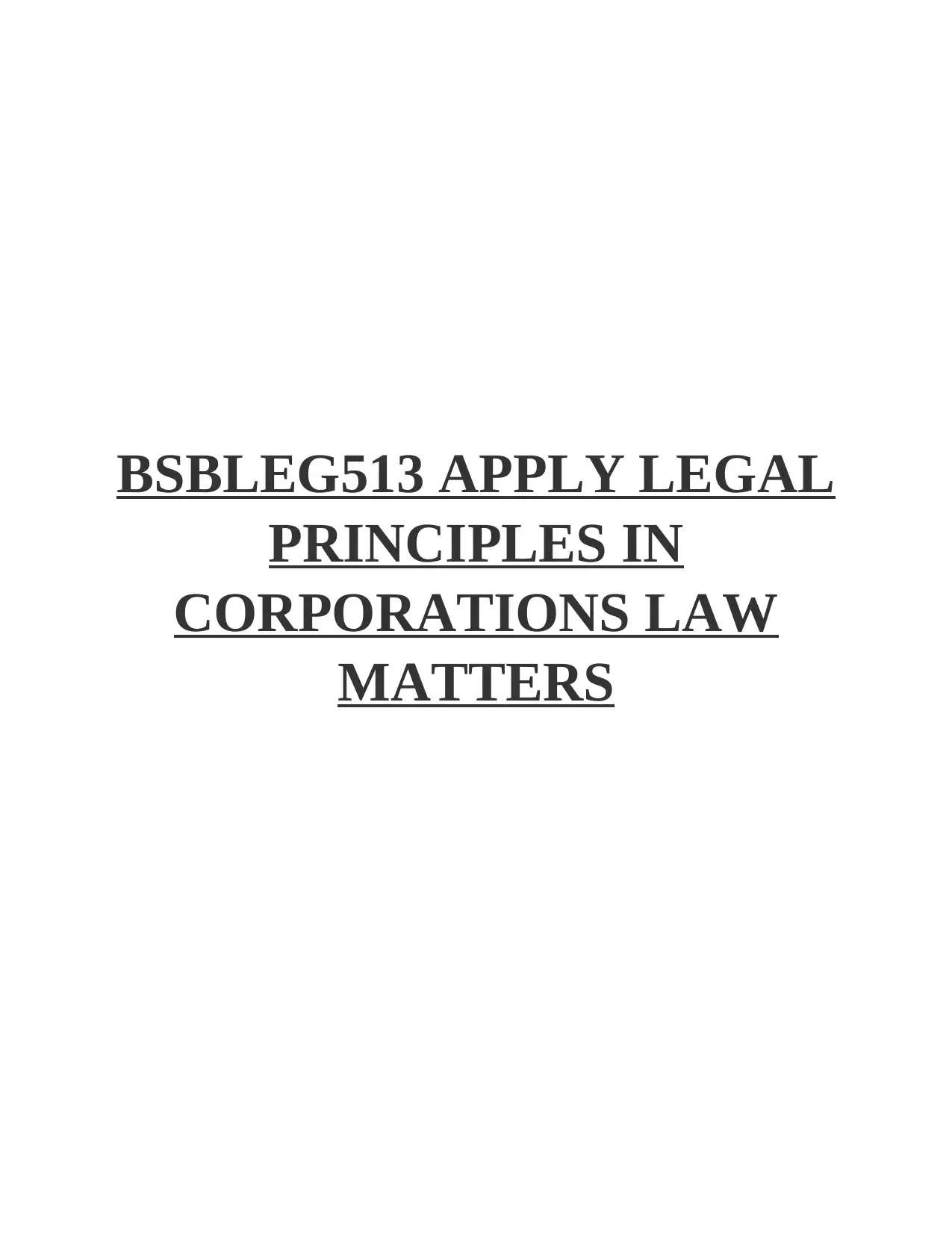
BSBLEG513 APPLY LEGAL
PRINCIPLES IN
CORPORATIONS LAW
MATTERS
PRINCIPLES IN
CORPORATIONS LAW
MATTERS
Secure Best Marks with AI Grader
Need help grading? Try our AI Grader for instant feedback on your assignments.
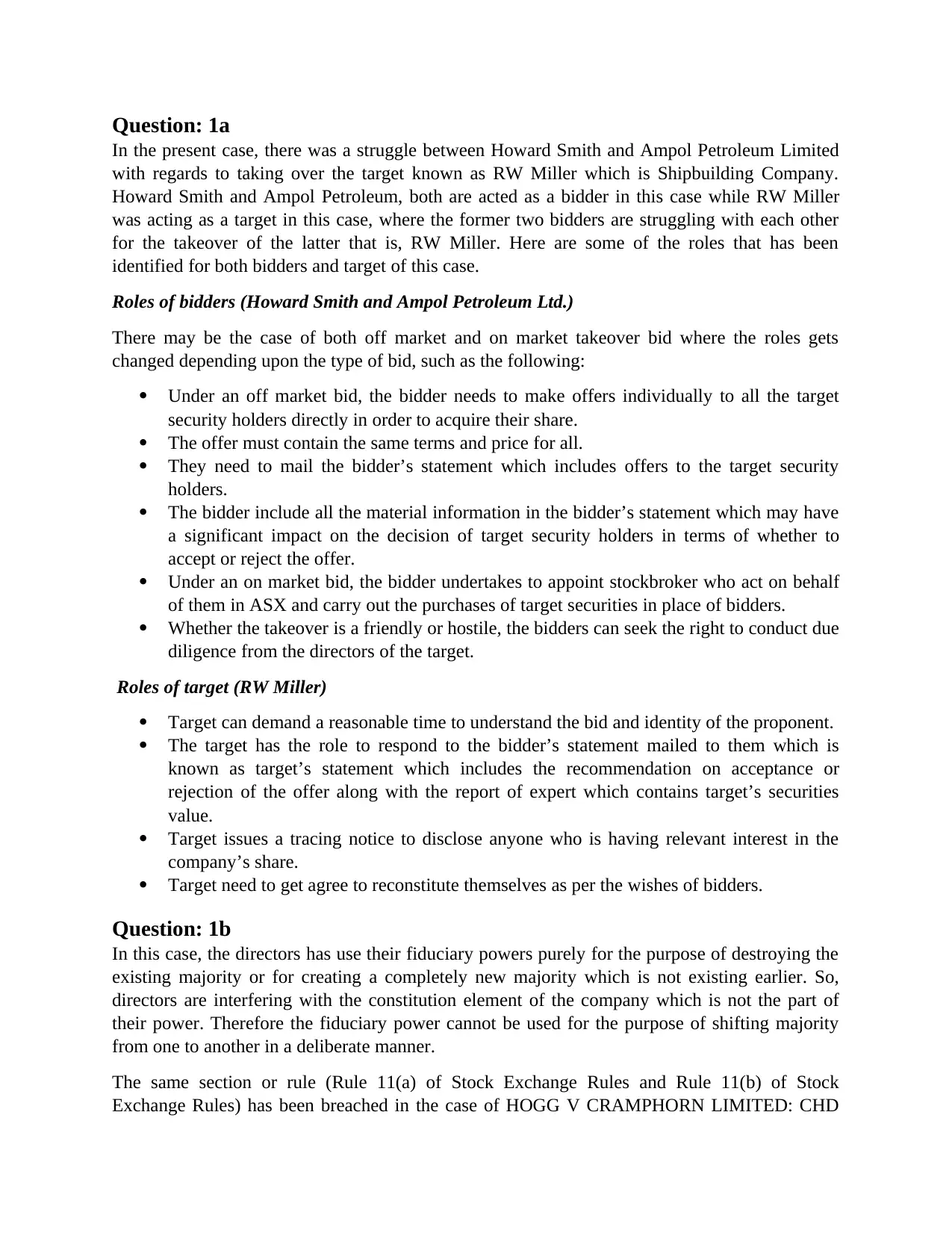
Question: 1a
In the present case, there was a struggle between Howard Smith and Ampol Petroleum Limited
with regards to taking over the target known as RW Miller which is Shipbuilding Company.
Howard Smith and Ampol Petroleum, both are acted as a bidder in this case while RW Miller
was acting as a target in this case, where the former two bidders are struggling with each other
for the takeover of the latter that is, RW Miller. Here are some of the roles that has been
identified for both bidders and target of this case.
Roles of bidders (Howard Smith and Ampol Petroleum Ltd.)
There may be the case of both off market and on market takeover bid where the roles gets
changed depending upon the type of bid, such as the following:
Under an off market bid, the bidder needs to make offers individually to all the target
security holders directly in order to acquire their share.
The offer must contain the same terms and price for all.
They need to mail the bidder’s statement which includes offers to the target security
holders.
The bidder include all the material information in the bidder’s statement which may have
a significant impact on the decision of target security holders in terms of whether to
accept or reject the offer.
Under an on market bid, the bidder undertakes to appoint stockbroker who act on behalf
of them in ASX and carry out the purchases of target securities in place of bidders.
Whether the takeover is a friendly or hostile, the bidders can seek the right to conduct due
diligence from the directors of the target.
Roles of target (RW Miller)
Target can demand a reasonable time to understand the bid and identity of the proponent.
The target has the role to respond to the bidder’s statement mailed to them which is
known as target’s statement which includes the recommendation on acceptance or
rejection of the offer along with the report of expert which contains target’s securities
value.
Target issues a tracing notice to disclose anyone who is having relevant interest in the
company’s share.
Target need to get agree to reconstitute themselves as per the wishes of bidders.
Question: 1b
In this case, the directors has use their fiduciary powers purely for the purpose of destroying the
existing majority or for creating a completely new majority which is not existing earlier. So,
directors are interfering with the constitution element of the company which is not the part of
their power. Therefore the fiduciary power cannot be used for the purpose of shifting majority
from one to another in a deliberate manner.
The same section or rule (Rule 11(a) of Stock Exchange Rules and Rule 11(b) of Stock
Exchange Rules) has been breached in the case of HOGG V CRAMPHORN LIMITED: CHD
In the present case, there was a struggle between Howard Smith and Ampol Petroleum Limited
with regards to taking over the target known as RW Miller which is Shipbuilding Company.
Howard Smith and Ampol Petroleum, both are acted as a bidder in this case while RW Miller
was acting as a target in this case, where the former two bidders are struggling with each other
for the takeover of the latter that is, RW Miller. Here are some of the roles that has been
identified for both bidders and target of this case.
Roles of bidders (Howard Smith and Ampol Petroleum Ltd.)
There may be the case of both off market and on market takeover bid where the roles gets
changed depending upon the type of bid, such as the following:
Under an off market bid, the bidder needs to make offers individually to all the target
security holders directly in order to acquire their share.
The offer must contain the same terms and price for all.
They need to mail the bidder’s statement which includes offers to the target security
holders.
The bidder include all the material information in the bidder’s statement which may have
a significant impact on the decision of target security holders in terms of whether to
accept or reject the offer.
Under an on market bid, the bidder undertakes to appoint stockbroker who act on behalf
of them in ASX and carry out the purchases of target securities in place of bidders.
Whether the takeover is a friendly or hostile, the bidders can seek the right to conduct due
diligence from the directors of the target.
Roles of target (RW Miller)
Target can demand a reasonable time to understand the bid and identity of the proponent.
The target has the role to respond to the bidder’s statement mailed to them which is
known as target’s statement which includes the recommendation on acceptance or
rejection of the offer along with the report of expert which contains target’s securities
value.
Target issues a tracing notice to disclose anyone who is having relevant interest in the
company’s share.
Target need to get agree to reconstitute themselves as per the wishes of bidders.
Question: 1b
In this case, the directors has use their fiduciary powers purely for the purpose of destroying the
existing majority or for creating a completely new majority which is not existing earlier. So,
directors are interfering with the constitution element of the company which is not the part of
their power. Therefore the fiduciary power cannot be used for the purpose of shifting majority
from one to another in a deliberate manner.
The same section or rule (Rule 11(a) of Stock Exchange Rules and Rule 11(b) of Stock
Exchange Rules) has been breached in the case of HOGG V CRAMPHORN LIMITED: CHD
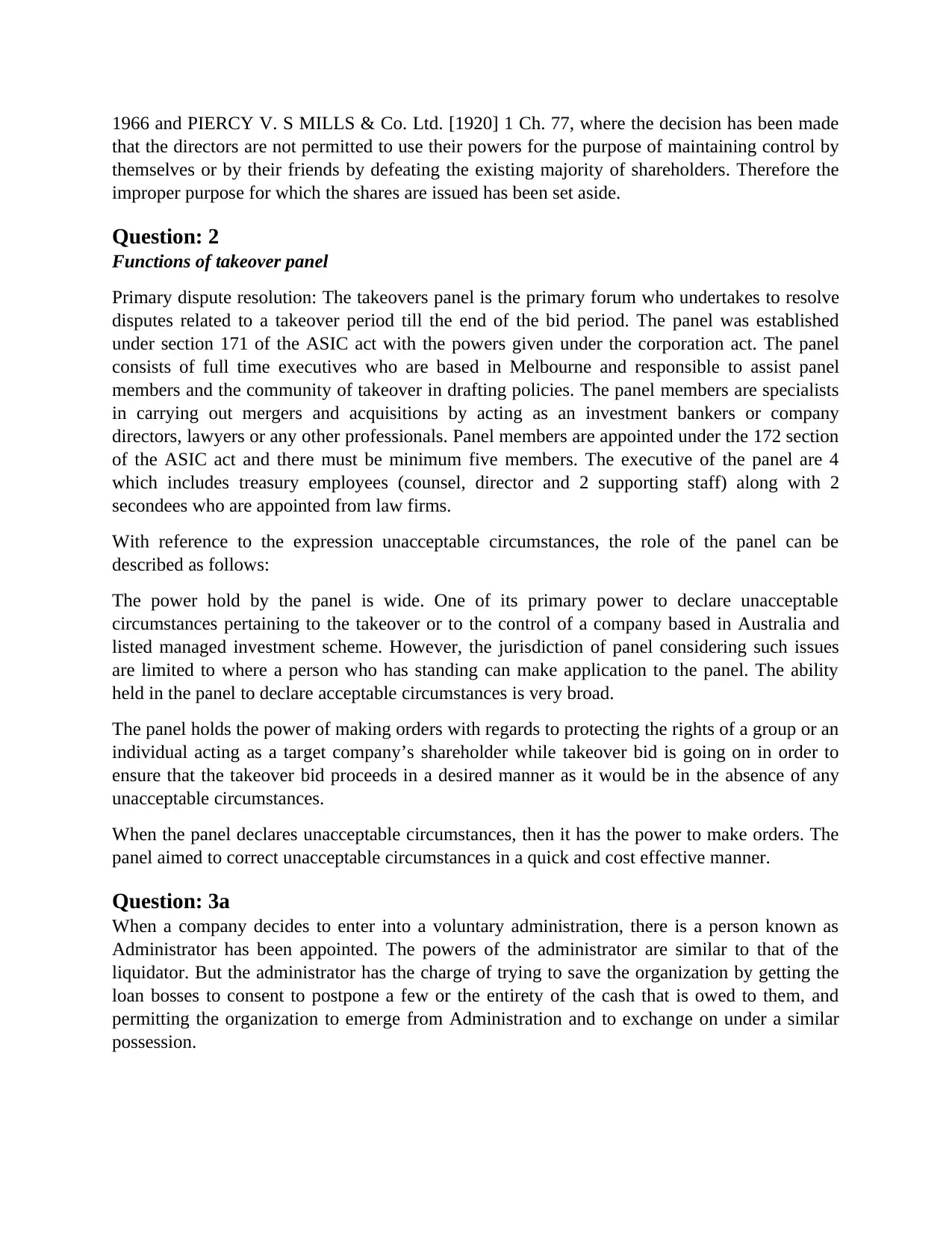
1966 and PIERCY V. S MILLS & Co. Ltd. [1920] 1 Ch. 77, where the decision has been made
that the directors are not permitted to use their powers for the purpose of maintaining control by
themselves or by their friends by defeating the existing majority of shareholders. Therefore the
improper purpose for which the shares are issued has been set aside.
Question: 2
Functions of takeover panel
Primary dispute resolution: The takeovers panel is the primary forum who undertakes to resolve
disputes related to a takeover period till the end of the bid period. The panel was established
under section 171 of the ASIC act with the powers given under the corporation act. The panel
consists of full time executives who are based in Melbourne and responsible to assist panel
members and the community of takeover in drafting policies. The panel members are specialists
in carrying out mergers and acquisitions by acting as an investment bankers or company
directors, lawyers or any other professionals. Panel members are appointed under the 172 section
of the ASIC act and there must be minimum five members. The executive of the panel are 4
which includes treasury employees (counsel, director and 2 supporting staff) along with 2
secondees who are appointed from law firms.
With reference to the expression unacceptable circumstances, the role of the panel can be
described as follows:
The power hold by the panel is wide. One of its primary power to declare unacceptable
circumstances pertaining to the takeover or to the control of a company based in Australia and
listed managed investment scheme. However, the jurisdiction of panel considering such issues
are limited to where a person who has standing can make application to the panel. The ability
held in the panel to declare acceptable circumstances is very broad.
The panel holds the power of making orders with regards to protecting the rights of a group or an
individual acting as a target company’s shareholder while takeover bid is going on in order to
ensure that the takeover bid proceeds in a desired manner as it would be in the absence of any
unacceptable circumstances.
When the panel declares unacceptable circumstances, then it has the power to make orders. The
panel aimed to correct unacceptable circumstances in a quick and cost effective manner.
Question: 3a
When a company decides to enter into a voluntary administration, there is a person known as
Administrator has been appointed. The powers of the administrator are similar to that of the
liquidator. But the administrator has the charge of trying to save the organization by getting the
loan bosses to consent to postpone a few or the entirety of the cash that is owed to them, and
permitting the organization to emerge from Administration and to exchange on under a similar
possession.
that the directors are not permitted to use their powers for the purpose of maintaining control by
themselves or by their friends by defeating the existing majority of shareholders. Therefore the
improper purpose for which the shares are issued has been set aside.
Question: 2
Functions of takeover panel
Primary dispute resolution: The takeovers panel is the primary forum who undertakes to resolve
disputes related to a takeover period till the end of the bid period. The panel was established
under section 171 of the ASIC act with the powers given under the corporation act. The panel
consists of full time executives who are based in Melbourne and responsible to assist panel
members and the community of takeover in drafting policies. The panel members are specialists
in carrying out mergers and acquisitions by acting as an investment bankers or company
directors, lawyers or any other professionals. Panel members are appointed under the 172 section
of the ASIC act and there must be minimum five members. The executive of the panel are 4
which includes treasury employees (counsel, director and 2 supporting staff) along with 2
secondees who are appointed from law firms.
With reference to the expression unacceptable circumstances, the role of the panel can be
described as follows:
The power hold by the panel is wide. One of its primary power to declare unacceptable
circumstances pertaining to the takeover or to the control of a company based in Australia and
listed managed investment scheme. However, the jurisdiction of panel considering such issues
are limited to where a person who has standing can make application to the panel. The ability
held in the panel to declare acceptable circumstances is very broad.
The panel holds the power of making orders with regards to protecting the rights of a group or an
individual acting as a target company’s shareholder while takeover bid is going on in order to
ensure that the takeover bid proceeds in a desired manner as it would be in the absence of any
unacceptable circumstances.
When the panel declares unacceptable circumstances, then it has the power to make orders. The
panel aimed to correct unacceptable circumstances in a quick and cost effective manner.
Question: 3a
When a company decides to enter into a voluntary administration, there is a person known as
Administrator has been appointed. The powers of the administrator are similar to that of the
liquidator. But the administrator has the charge of trying to save the organization by getting the
loan bosses to consent to postpone a few or the entirety of the cash that is owed to them, and
permitting the organization to emerge from Administration and to exchange on under a similar
possession.
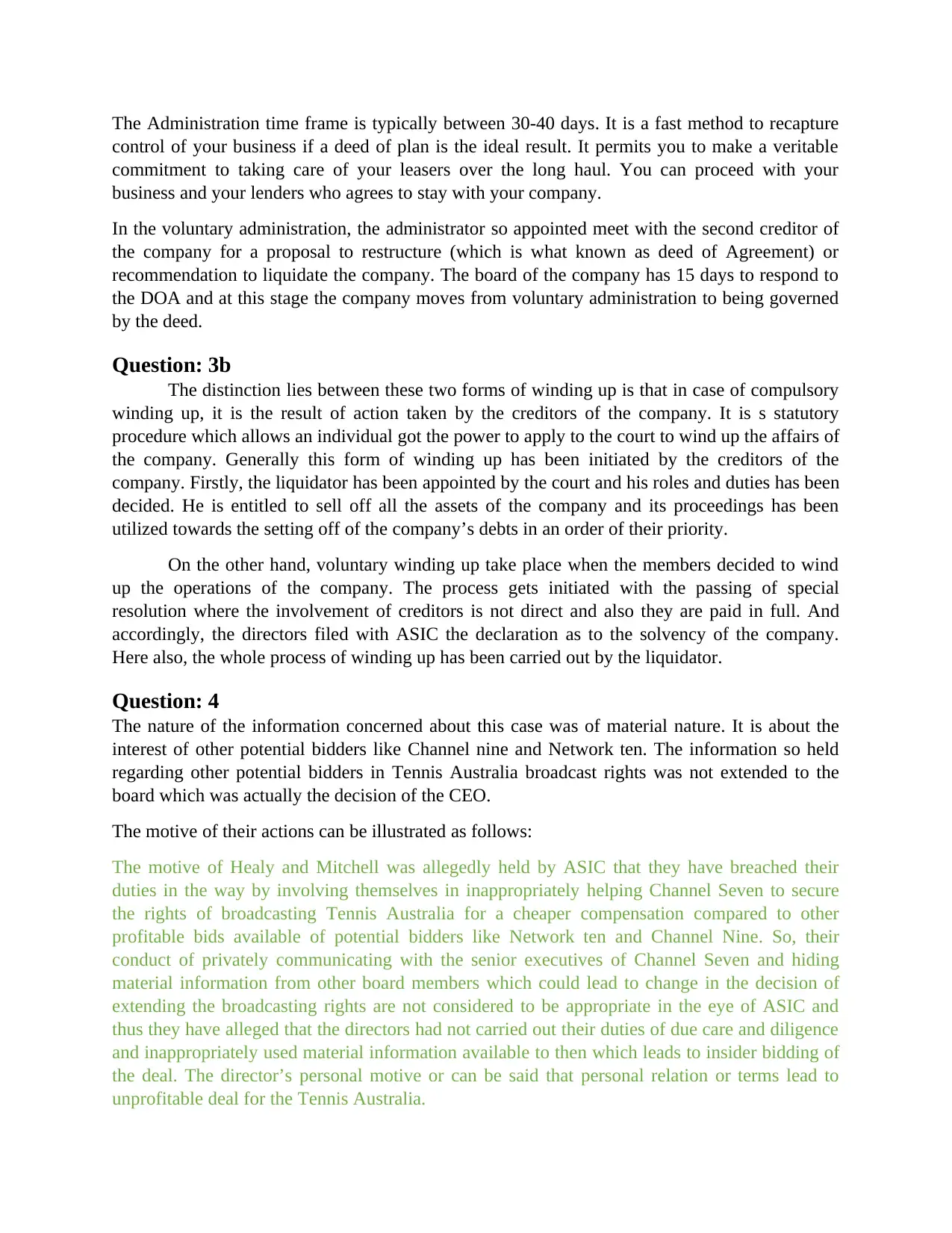
The Administration time frame is typically between 30-40 days. It is a fast method to recapture
control of your business if a deed of plan is the ideal result. It permits you to make a veritable
commitment to taking care of your leasers over the long haul. You can proceed with your
business and your lenders who agrees to stay with your company.
In the voluntary administration, the administrator so appointed meet with the second creditor of
the company for a proposal to restructure (which is what known as deed of Agreement) or
recommendation to liquidate the company. The board of the company has 15 days to respond to
the DOA and at this stage the company moves from voluntary administration to being governed
by the deed.
Question: 3b
The distinction lies between these two forms of winding up is that in case of compulsory
winding up, it is the result of action taken by the creditors of the company. It is s statutory
procedure which allows an individual got the power to apply to the court to wind up the affairs of
the company. Generally this form of winding up has been initiated by the creditors of the
company. Firstly, the liquidator has been appointed by the court and his roles and duties has been
decided. He is entitled to sell off all the assets of the company and its proceedings has been
utilized towards the setting off of the company’s debts in an order of their priority.
On the other hand, voluntary winding up take place when the members decided to wind
up the operations of the company. The process gets initiated with the passing of special
resolution where the involvement of creditors is not direct and also they are paid in full. And
accordingly, the directors filed with ASIC the declaration as to the solvency of the company.
Here also, the whole process of winding up has been carried out by the liquidator.
Question: 4
The nature of the information concerned about this case was of material nature. It is about the
interest of other potential bidders like Channel nine and Network ten. The information so held
regarding other potential bidders in Tennis Australia broadcast rights was not extended to the
board which was actually the decision of the CEO.
The motive of their actions can be illustrated as follows:
The motive of Healy and Mitchell was allegedly held by ASIC that they have breached their
duties in the way by involving themselves in inappropriately helping Channel Seven to secure
the rights of broadcasting Tennis Australia for a cheaper compensation compared to other
profitable bids available of potential bidders like Network ten and Channel Nine. So, their
conduct of privately communicating with the senior executives of Channel Seven and hiding
material information from other board members which could lead to change in the decision of
extending the broadcasting rights are not considered to be appropriate in the eye of ASIC and
thus they have alleged that the directors had not carried out their duties of due care and diligence
and inappropriately used material information available to then which leads to insider bidding of
the deal. The director’s personal motive or can be said that personal relation or terms lead to
unprofitable deal for the Tennis Australia.
control of your business if a deed of plan is the ideal result. It permits you to make a veritable
commitment to taking care of your leasers over the long haul. You can proceed with your
business and your lenders who agrees to stay with your company.
In the voluntary administration, the administrator so appointed meet with the second creditor of
the company for a proposal to restructure (which is what known as deed of Agreement) or
recommendation to liquidate the company. The board of the company has 15 days to respond to
the DOA and at this stage the company moves from voluntary administration to being governed
by the deed.
Question: 3b
The distinction lies between these two forms of winding up is that in case of compulsory
winding up, it is the result of action taken by the creditors of the company. It is s statutory
procedure which allows an individual got the power to apply to the court to wind up the affairs of
the company. Generally this form of winding up has been initiated by the creditors of the
company. Firstly, the liquidator has been appointed by the court and his roles and duties has been
decided. He is entitled to sell off all the assets of the company and its proceedings has been
utilized towards the setting off of the company’s debts in an order of their priority.
On the other hand, voluntary winding up take place when the members decided to wind
up the operations of the company. The process gets initiated with the passing of special
resolution where the involvement of creditors is not direct and also they are paid in full. And
accordingly, the directors filed with ASIC the declaration as to the solvency of the company.
Here also, the whole process of winding up has been carried out by the liquidator.
Question: 4
The nature of the information concerned about this case was of material nature. It is about the
interest of other potential bidders like Channel nine and Network ten. The information so held
regarding other potential bidders in Tennis Australia broadcast rights was not extended to the
board which was actually the decision of the CEO.
The motive of their actions can be illustrated as follows:
The motive of Healy and Mitchell was allegedly held by ASIC that they have breached their
duties in the way by involving themselves in inappropriately helping Channel Seven to secure
the rights of broadcasting Tennis Australia for a cheaper compensation compared to other
profitable bids available of potential bidders like Network ten and Channel Nine. So, their
conduct of privately communicating with the senior executives of Channel Seven and hiding
material information from other board members which could lead to change in the decision of
extending the broadcasting rights are not considered to be appropriate in the eye of ASIC and
thus they have alleged that the directors had not carried out their duties of due care and diligence
and inappropriately used material information available to then which leads to insider bidding of
the deal. The director’s personal motive or can be said that personal relation or terms lead to
unprofitable deal for the Tennis Australia.
Secure Best Marks with AI Grader
Need help grading? Try our AI Grader for instant feedback on your assignments.
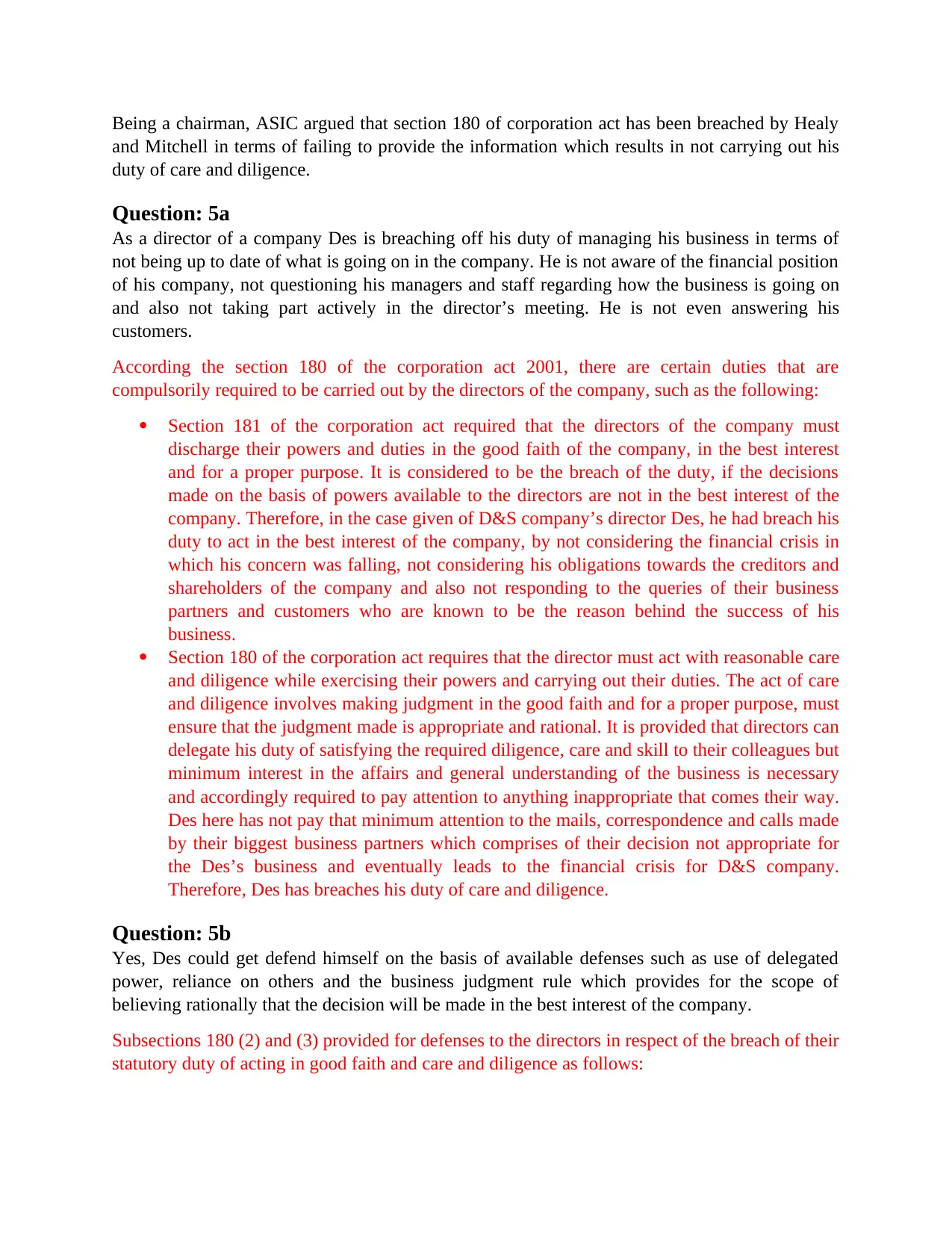
Being a chairman, ASIC argued that section 180 of corporation act has been breached by Healy
and Mitchell in terms of failing to provide the information which results in not carrying out his
duty of care and diligence.
Question: 5a
As a director of a company Des is breaching off his duty of managing his business in terms of
not being up to date of what is going on in the company. He is not aware of the financial position
of his company, not questioning his managers and staff regarding how the business is going on
and also not taking part actively in the director’s meeting. He is not even answering his
customers.
According the section 180 of the corporation act 2001, there are certain duties that are
compulsorily required to be carried out by the directors of the company, such as the following:
Section 181 of the corporation act required that the directors of the company must
discharge their powers and duties in the good faith of the company, in the best interest
and for a proper purpose. It is considered to be the breach of the duty, if the decisions
made on the basis of powers available to the directors are not in the best interest of the
company. Therefore, in the case given of D&S company’s director Des, he had breach his
duty to act in the best interest of the company, by not considering the financial crisis in
which his concern was falling, not considering his obligations towards the creditors and
shareholders of the company and also not responding to the queries of their business
partners and customers who are known to be the reason behind the success of his
business.
Section 180 of the corporation act requires that the director must act with reasonable care
and diligence while exercising their powers and carrying out their duties. The act of care
and diligence involves making judgment in the good faith and for a proper purpose, must
ensure that the judgment made is appropriate and rational. It is provided that directors can
delegate his duty of satisfying the required diligence, care and skill to their colleagues but
minimum interest in the affairs and general understanding of the business is necessary
and accordingly required to pay attention to anything inappropriate that comes their way.
Des here has not pay that minimum attention to the mails, correspondence and calls made
by their biggest business partners which comprises of their decision not appropriate for
the Des’s business and eventually leads to the financial crisis for D&S company.
Therefore, Des has breaches his duty of care and diligence.
Question: 5b
Yes, Des could get defend himself on the basis of available defenses such as use of delegated
power, reliance on others and the business judgment rule which provides for the scope of
believing rationally that the decision will be made in the best interest of the company.
Subsections 180 (2) and (3) provided for defenses to the directors in respect of the breach of their
statutory duty of acting in good faith and care and diligence as follows:
and Mitchell in terms of failing to provide the information which results in not carrying out his
duty of care and diligence.
Question: 5a
As a director of a company Des is breaching off his duty of managing his business in terms of
not being up to date of what is going on in the company. He is not aware of the financial position
of his company, not questioning his managers and staff regarding how the business is going on
and also not taking part actively in the director’s meeting. He is not even answering his
customers.
According the section 180 of the corporation act 2001, there are certain duties that are
compulsorily required to be carried out by the directors of the company, such as the following:
Section 181 of the corporation act required that the directors of the company must
discharge their powers and duties in the good faith of the company, in the best interest
and for a proper purpose. It is considered to be the breach of the duty, if the decisions
made on the basis of powers available to the directors are not in the best interest of the
company. Therefore, in the case given of D&S company’s director Des, he had breach his
duty to act in the best interest of the company, by not considering the financial crisis in
which his concern was falling, not considering his obligations towards the creditors and
shareholders of the company and also not responding to the queries of their business
partners and customers who are known to be the reason behind the success of his
business.
Section 180 of the corporation act requires that the director must act with reasonable care
and diligence while exercising their powers and carrying out their duties. The act of care
and diligence involves making judgment in the good faith and for a proper purpose, must
ensure that the judgment made is appropriate and rational. It is provided that directors can
delegate his duty of satisfying the required diligence, care and skill to their colleagues but
minimum interest in the affairs and general understanding of the business is necessary
and accordingly required to pay attention to anything inappropriate that comes their way.
Des here has not pay that minimum attention to the mails, correspondence and calls made
by their biggest business partners which comprises of their decision not appropriate for
the Des’s business and eventually leads to the financial crisis for D&S company.
Therefore, Des has breaches his duty of care and diligence.
Question: 5b
Yes, Des could get defend himself on the basis of available defenses such as use of delegated
power, reliance on others and the business judgment rule which provides for the scope of
believing rationally that the decision will be made in the best interest of the company.
Subsections 180 (2) and (3) provided for defenses to the directors in respect of the breach of their
statutory duty of acting in good faith and care and diligence as follows:
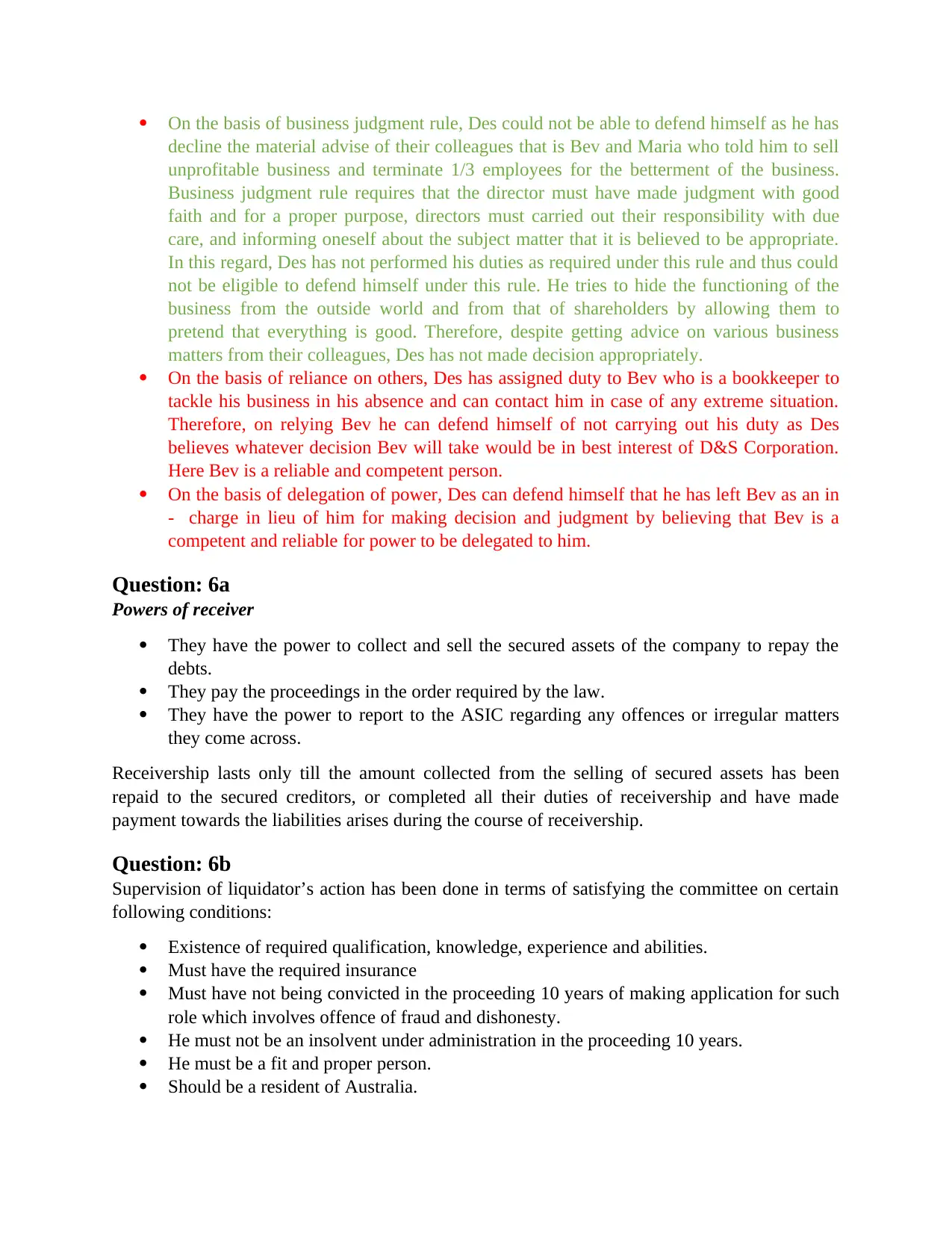
On the basis of business judgment rule, Des could not be able to defend himself as he has
decline the material advise of their colleagues that is Bev and Maria who told him to sell
unprofitable business and terminate 1/3 employees for the betterment of the business.
Business judgment rule requires that the director must have made judgment with good
faith and for a proper purpose, directors must carried out their responsibility with due
care, and informing oneself about the subject matter that it is believed to be appropriate.
In this regard, Des has not performed his duties as required under this rule and thus could
not be eligible to defend himself under this rule. He tries to hide the functioning of the
business from the outside world and from that of shareholders by allowing them to
pretend that everything is good. Therefore, despite getting advice on various business
matters from their colleagues, Des has not made decision appropriately.
On the basis of reliance on others, Des has assigned duty to Bev who is a bookkeeper to
tackle his business in his absence and can contact him in case of any extreme situation.
Therefore, on relying Bev he can defend himself of not carrying out his duty as Des
believes whatever decision Bev will take would be in best interest of D&S Corporation.
Here Bev is a reliable and competent person.
On the basis of delegation of power, Des can defend himself that he has left Bev as an in
- charge in lieu of him for making decision and judgment by believing that Bev is a
competent and reliable for power to be delegated to him.
Question: 6a
Powers of receiver
They have the power to collect and sell the secured assets of the company to repay the
debts.
They pay the proceedings in the order required by the law.
They have the power to report to the ASIC regarding any offences or irregular matters
they come across.
Receivership lasts only till the amount collected from the selling of secured assets has been
repaid to the secured creditors, or completed all their duties of receivership and have made
payment towards the liabilities arises during the course of receivership.
Question: 6b
Supervision of liquidator’s action has been done in terms of satisfying the committee on certain
following conditions:
Existence of required qualification, knowledge, experience and abilities.
Must have the required insurance
Must have not being convicted in the proceeding 10 years of making application for such
role which involves offence of fraud and dishonesty.
He must not be an insolvent under administration in the proceeding 10 years.
He must be a fit and proper person.
Should be a resident of Australia.
decline the material advise of their colleagues that is Bev and Maria who told him to sell
unprofitable business and terminate 1/3 employees for the betterment of the business.
Business judgment rule requires that the director must have made judgment with good
faith and for a proper purpose, directors must carried out their responsibility with due
care, and informing oneself about the subject matter that it is believed to be appropriate.
In this regard, Des has not performed his duties as required under this rule and thus could
not be eligible to defend himself under this rule. He tries to hide the functioning of the
business from the outside world and from that of shareholders by allowing them to
pretend that everything is good. Therefore, despite getting advice on various business
matters from their colleagues, Des has not made decision appropriately.
On the basis of reliance on others, Des has assigned duty to Bev who is a bookkeeper to
tackle his business in his absence and can contact him in case of any extreme situation.
Therefore, on relying Bev he can defend himself of not carrying out his duty as Des
believes whatever decision Bev will take would be in best interest of D&S Corporation.
Here Bev is a reliable and competent person.
On the basis of delegation of power, Des can defend himself that he has left Bev as an in
- charge in lieu of him for making decision and judgment by believing that Bev is a
competent and reliable for power to be delegated to him.
Question: 6a
Powers of receiver
They have the power to collect and sell the secured assets of the company to repay the
debts.
They pay the proceedings in the order required by the law.
They have the power to report to the ASIC regarding any offences or irregular matters
they come across.
Receivership lasts only till the amount collected from the selling of secured assets has been
repaid to the secured creditors, or completed all their duties of receivership and have made
payment towards the liabilities arises during the course of receivership.
Question: 6b
Supervision of liquidator’s action has been done in terms of satisfying the committee on certain
following conditions:
Existence of required qualification, knowledge, experience and abilities.
Must have the required insurance
Must have not being convicted in the proceeding 10 years of making application for such
role which involves offence of fraud and dishonesty.
He must not be an insolvent under administration in the proceeding 10 years.
He must be a fit and proper person.
Should be a resident of Australia.
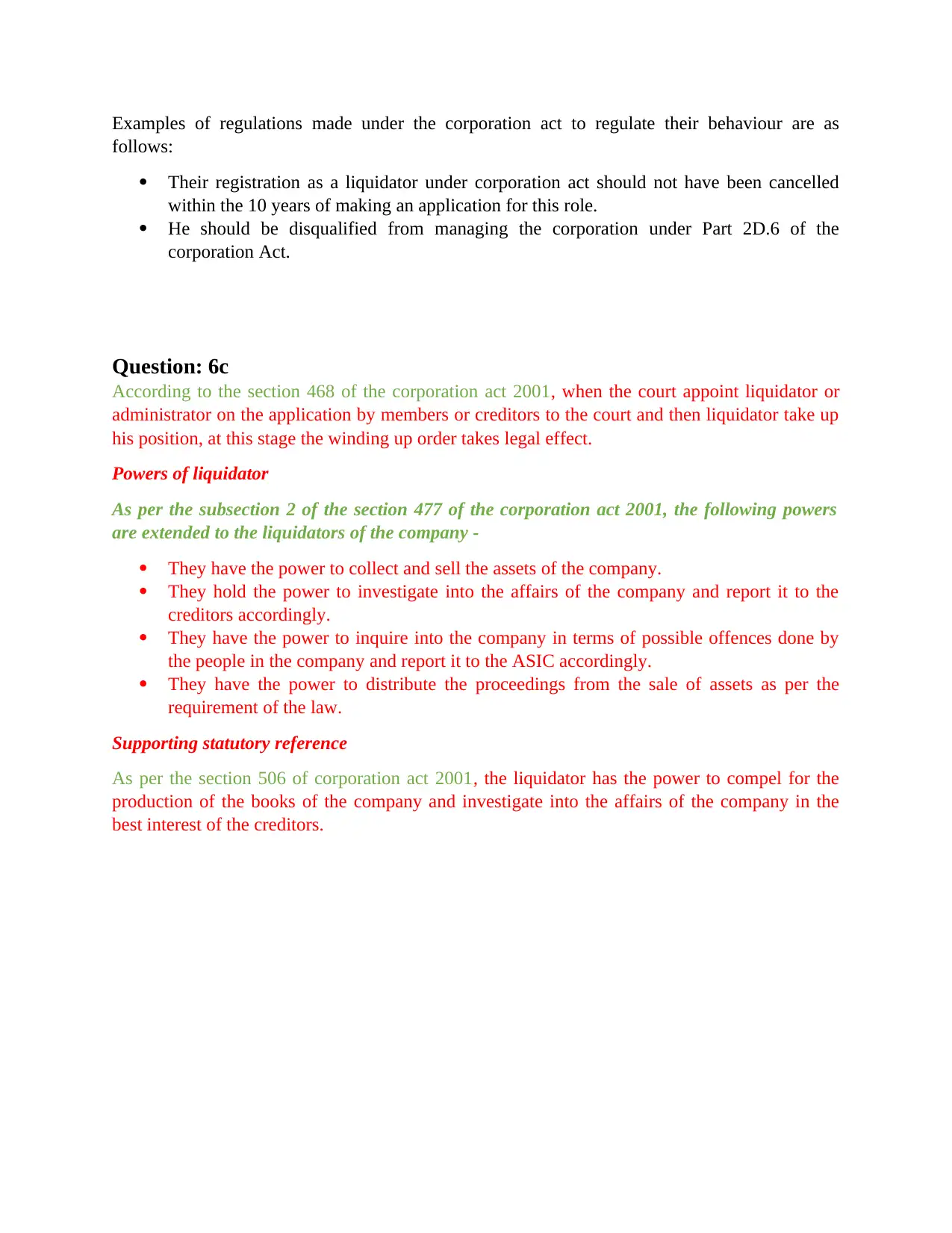
Examples of regulations made under the corporation act to regulate their behaviour are as
follows:
Their registration as a liquidator under corporation act should not have been cancelled
within the 10 years of making an application for this role.
He should be disqualified from managing the corporation under Part 2D.6 of the
corporation Act.
Question: 6c
According to the section 468 of the corporation act 2001, when the court appoint liquidator or
administrator on the application by members or creditors to the court and then liquidator take up
his position, at this stage the winding up order takes legal effect.
Powers of liquidator
As per the subsection 2 of the section 477 of the corporation act 2001, the following powers
are extended to the liquidators of the company -
They have the power to collect and sell the assets of the company.
They hold the power to investigate into the affairs of the company and report it to the
creditors accordingly.
They have the power to inquire into the company in terms of possible offences done by
the people in the company and report it to the ASIC accordingly.
They have the power to distribute the proceedings from the sale of assets as per the
requirement of the law.
Supporting statutory reference
As per the section 506 of corporation act 2001, the liquidator has the power to compel for the
production of the books of the company and investigate into the affairs of the company in the
best interest of the creditors.
follows:
Their registration as a liquidator under corporation act should not have been cancelled
within the 10 years of making an application for this role.
He should be disqualified from managing the corporation under Part 2D.6 of the
corporation Act.
Question: 6c
According to the section 468 of the corporation act 2001, when the court appoint liquidator or
administrator on the application by members or creditors to the court and then liquidator take up
his position, at this stage the winding up order takes legal effect.
Powers of liquidator
As per the subsection 2 of the section 477 of the corporation act 2001, the following powers
are extended to the liquidators of the company -
They have the power to collect and sell the assets of the company.
They hold the power to investigate into the affairs of the company and report it to the
creditors accordingly.
They have the power to inquire into the company in terms of possible offences done by
the people in the company and report it to the ASIC accordingly.
They have the power to distribute the proceedings from the sale of assets as per the
requirement of the law.
Supporting statutory reference
As per the section 506 of corporation act 2001, the liquidator has the power to compel for the
production of the books of the company and investigate into the affairs of the company in the
best interest of the creditors.
Paraphrase This Document
Need a fresh take? Get an instant paraphrase of this document with our AI Paraphraser
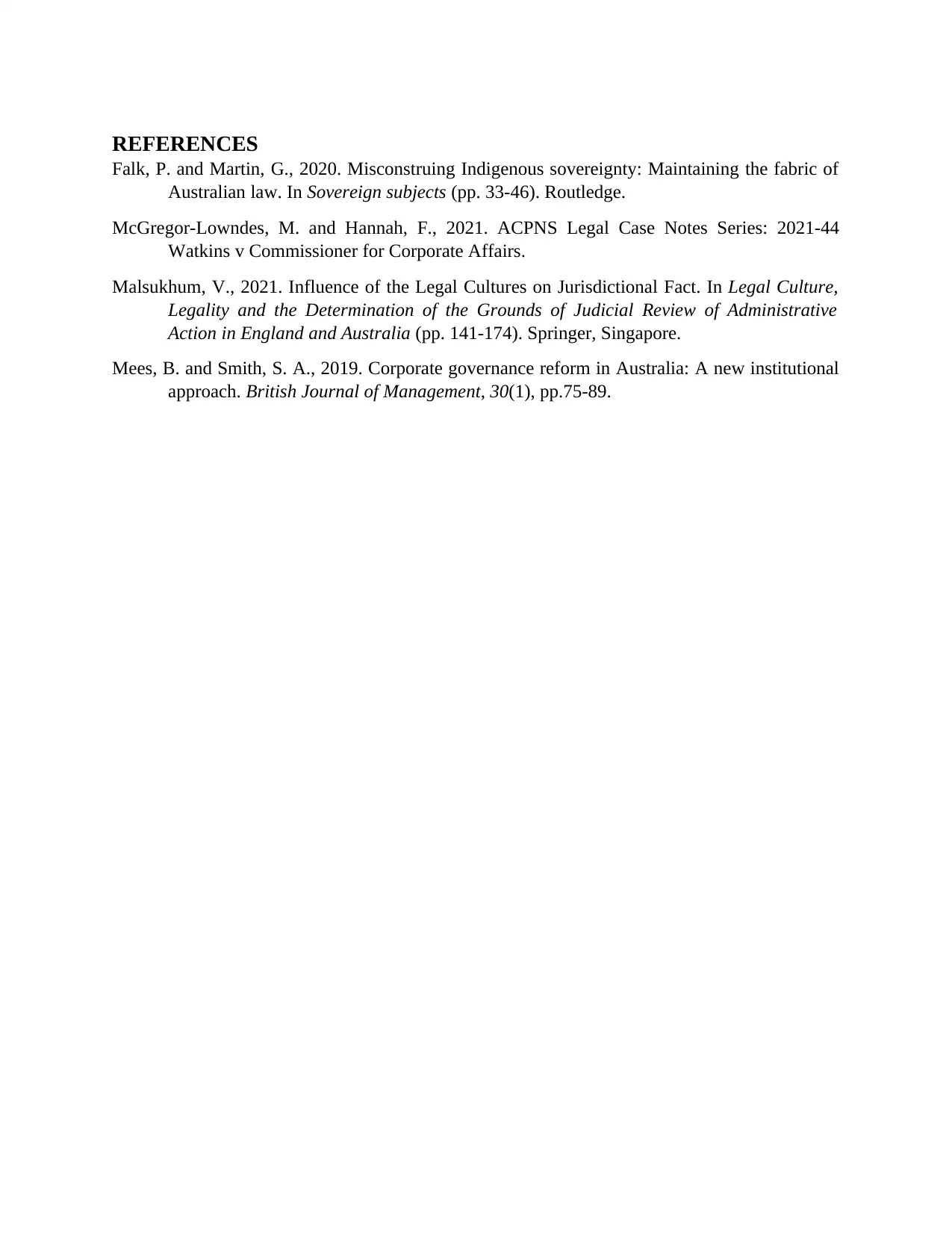
REFERENCES
Falk, P. and Martin, G., 2020. Misconstruing Indigenous sovereignty: Maintaining the fabric of
Australian law. In Sovereign subjects (pp. 33-46). Routledge.
McGregor-Lowndes, M. and Hannah, F., 2021. ACPNS Legal Case Notes Series: 2021-44
Watkins v Commissioner for Corporate Affairs.
Malsukhum, V., 2021. Influence of the Legal Cultures on Jurisdictional Fact. In Legal Culture,
Legality and the Determination of the Grounds of Judicial Review of Administrative
Action in England and Australia (pp. 141-174). Springer, Singapore.
Mees, B. and Smith, S. A., 2019. Corporate governance reform in Australia: A new institutional
approach. British Journal of Management, 30(1), pp.75-89.
Falk, P. and Martin, G., 2020. Misconstruing Indigenous sovereignty: Maintaining the fabric of
Australian law. In Sovereign subjects (pp. 33-46). Routledge.
McGregor-Lowndes, M. and Hannah, F., 2021. ACPNS Legal Case Notes Series: 2021-44
Watkins v Commissioner for Corporate Affairs.
Malsukhum, V., 2021. Influence of the Legal Cultures on Jurisdictional Fact. In Legal Culture,
Legality and the Determination of the Grounds of Judicial Review of Administrative
Action in England and Australia (pp. 141-174). Springer, Singapore.
Mees, B. and Smith, S. A., 2019. Corporate governance reform in Australia: A new institutional
approach. British Journal of Management, 30(1), pp.75-89.
1 out of 8
Related Documents
Your All-in-One AI-Powered Toolkit for Academic Success.
+13062052269
info@desklib.com
Available 24*7 on WhatsApp / Email
![[object Object]](/_next/static/media/star-bottom.7253800d.svg)
Unlock your academic potential
© 2024 | Zucol Services PVT LTD | All rights reserved.



